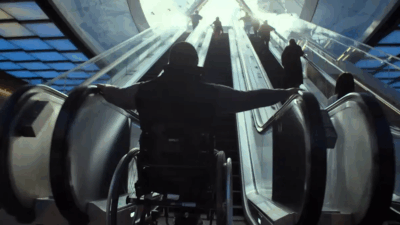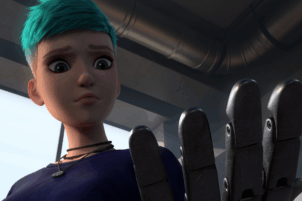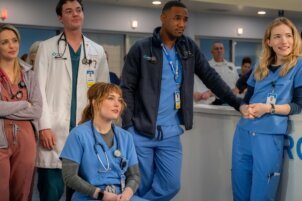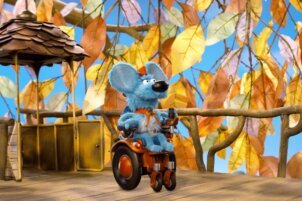“The biggest barrier to change is this tiny sliver of fear that people have surrounding disability, and I made this film to push people over that barrier.”
 The new documentary Rising Phoenix: A New Revolution grabs viewers’ attention from the opening, pulling both disabled and nondisabled audiences in to become immersed in a world full of authentic disability representation.
The new documentary Rising Phoenix: A New Revolution grabs viewers’ attention from the opening, pulling both disabled and nondisabled audiences in to become immersed in a world full of authentic disability representation.
The film is directed by Sheridan O’Donnell, who was diagnosed with a degenerative eye disease while having an active career as a filmmaker. This has slowly rendered him legally blind. Trying to navigate this new world of being disabled, O’Donnell seeks out accomplished disabled individuals from multiple sectors and walks of life, and highlights their struggles, and eventual achievements. The point of O’Donnell’s film is not to showcase these achievements in spite of disability; rather, he showcases these achievements in spite of the social perception, lack of access, and lack of understanding that too often befalls the disability community.
With a goal of redefining the world’s image of disability, the film features a variety of disabled individuals including actor Lauren Ridloff (Eternals), Paralympic Gold Medalists Ezra Frech (Track and Field) and Anastasia Pagonis (Swimming), filmmaker Jim LeBrecht (Crip Camp), MTA Chief Accessibility Officer Quemel (Q) Arroyo, Valuable 500 Founder Caroline Casey, and more.
Rising Phoenix: A New Revolution celebrates diversity, from a disability perspective and a career perspective, exploring four major themes: accessibility, employment, representation, and the image of disability. There are stories of people who were deaf, blind, and otherwise disabled at birth; there are those who became disabled due to an accident or disease. They come from all over the world and work in all sectors, from the entertainment industry to athletics and cultural changemakers in business. In addition to being disabled, they hold multiple identities that make up who they are.
“I wanted to find multidimensional people who were both in a way authorities on those subjects but also could speak from a very personal place regarding that subject,” O’Donnell said in an interview with Disability Belongs™. “So, for instance, while Q is the Chief Accessibility Officer of the MTA, he’s also a wheelchair user in New York City who became disabled at eighteen and knows firsthand how a lack of accessibility has impacted his life.”
O’Donnell also shared that he looked for “the kind of people who non-disabled people often don’t elect to put in front of the camera.”
“People that felt like they would help radically redefine our preconceived image of disability, which is what the film is ultimately about,” he added. “So Q is also a foul-mouthed, in-your-face New Yorker from Harlem, and I loved that about him. I wanted those edges. You don’t see those edges in current representation enough. So, beyond being articulate speakers, they first and foremost had to be dynamic and interesting people.”
O’Donnell skillfully captures many deep and nuanced conversations throughout the film that give the audience a deeper look into the psychology of going through life while disabled. The feelings of inadequacy navigating a world not built for them. Deep depressions among those who become disabled, fearful of what they might lose, yet to realize what they still have to gain. Looking toward the screen and never seeing anyone who looked like them and looking out in the world and seeing a similar lack of representation. Wondering if they could ever be loved, if they could ever be beautiful.
It is through this vulnerability and emotion that these individuals are able to accept and appreciate who they are and the gifts they can bring to the world; gifts that not only help those who are likewise disabled, but those who are non-disabled as well.
O’Donnell achieves success not only due to his expertise but also by ensuring these stories are supported by a disabled crew. In fact, 50 percent of the entire crew was disabled, which was a mandate set by Greg Nugent, co-founder of production company HTYT Films, and producer Barnaby Spurrier.
“It was important because to me it represents that change for disabled people needs to go beyond enabling the exceptional,” O’Donnell said. “It isn’t enough to have one director or one actor for every ten thousand disabled people. If we’re going to have real change, every disabled person needs opportunity, and to me the mandate represents that in a way.”
O’Donnell is an alumnus of the 2022 Disability Belongs™ Entertainment Lab and reflects the mission of the program. When he was offered the opportunity to direct Rising Phoenix: A New Revolution, he actively helped additional disabled creatives find opportunity, including by bringing Robert Burns (2023 Lab alumnus and 2024 Physical Production Intensive alumnus) on as the Director’s Assistant and Isabella Vargas (2022 alum) on as a New York Intern.
O’Donnell hopes the film will enable more nondisabled audience members to give the disability community empathy.
“I hope that through the film, which I constructed to be as vulnerable and experiential as possible, they can truly empathize with our issues from a human level,” he said. “To know our issues aren’t talking points, statistics, charts and graphs, but rather real things that affect our very real lives. And to hopefully start a conversation. To encourage them to ask questions and interact with disabled people more often. The biggest barrier to change is this tiny sliver of fear that people have surrounding disability, and I made this film to push people over that barrier.”
These stories are not presented as a means of portraying inspiration or to spark any feelings of witnessing miracles. The people featured in the film achieve great things like winning gold medals, starring in blockbuster films, and gaining worldwide attention. They do it because they can, and because they want to. The film shows viewers that disabled people are capable of anything but are not celebrated due to overcoming a disability. Instead, the film promotes the idea that if anything should change, it should be the world around us, not us around the world.
“I hope that disabled people can see themselves in these characters, and both honor their individual disabilities but ultimately come together,” O’Donnell said. “The disability community is unlike any other minority group in that we are really an amalgam of minorities, and we have to truly come together as one group if we’re going to have our voices heard.”
Rising Phoenix: A New Revolution had its world premiere at the ReelAbilities Film Festival in New York City. ReelAbilities is the United States’ largest film festival dedicated to showcasing films by, or about, people with disabilities. The film is a part of the Rising Phoenix series of media, which showcase the numerous human stories of people with disabilities, as well as the path forward for accessibility.







